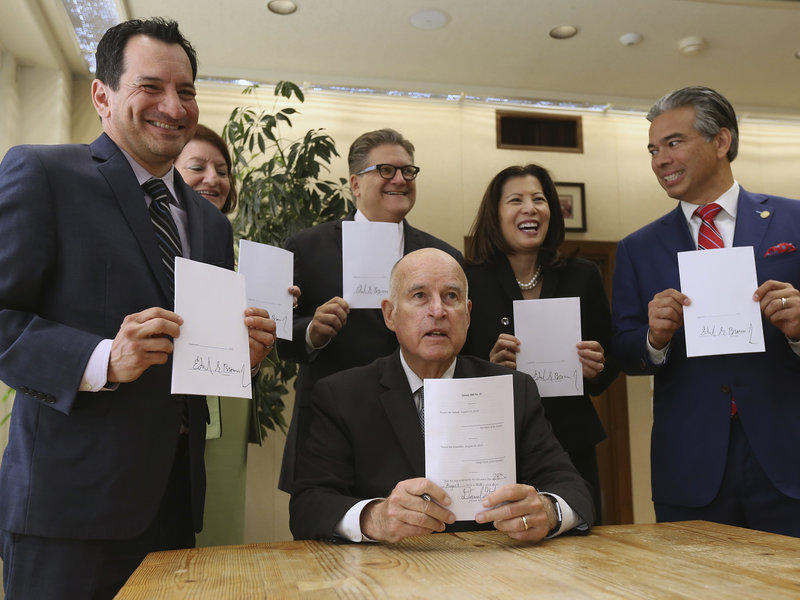Governor signs bill, abolishes cash bail
Rich Pedroncelli/AP
Governor Brown holds up a copy of the bill, surrounded by (left to right) Assembly Speaker Anthony Rendon (D-Los Angeles), Senate President pro Tempore Toni Atkins (D-San Diego), state Senator Bob Hertzberg (D-Van Nuys), California Supreme Court Chief Justice Tani Cantil-Sakauye, and Assemblyman Rob Bonta (D-Alameda)
October 17, 2018
The California Money Bail Reform Act (Senate Bill 10) makes California the first state in the country to completely eliminate cash bail and replace it with a risk assessment system. Governor Jerry Brown signed the bill on Aug. 28.
Starting in October 2019, suspects awaiting trial in California will be gauged under a risk assessment system to decide whether the suspect is eligible for release pending trial. Suspects with previous criminal records, specifically sex offenders, violent felons, and multiple DUIs will not be eligible for pretrial release.
Senate Bill 10 is the result of years of campaigning and a nationwide push to end money bail that has been argued creates an unequal justice system where only the wealthy have the opportunity to be released. Poor people often stay in jail or accept unfair plea bargains in order to get out. Posting bail requires paying a bail bonds company 10 percent of the bail amount, which is no problem for wealthier people.
As trials may take months to prepare, those who cannot pay bail may lose their jobs and spend months of their lives in jail. In a statement, Brown claimed that the bill, “reforms [the] bail system so that rich and poor alike are treated fairly.”
In January, the California Court of Appeal found the money bail system to be unconstitutional. Most legislators in California agree that it is a flawed system, although opinions differ on how to fix it. According to the Sacramento Bee “nearly two thirds of inmates in California jails are being held awaiting trial.”
The ACLU of California, a strong proponent of bail reform, reports that black men have average bail amounts that are 35 percent higher than those of white men. In addition, those who cannot pay bail are more likely to plead guilty in order to return home, diminishing their right to a fair trial.
However, not all who advocate for bail reform are in favor of SB10.
Heavy opposition to SB10 comes from the bail bond industry, but also, surprisingly, organizations like the ACLU and other supporters of bail reform.
Representatives of the California ACLU released a statement explaining their position on Aug. 20, stating “SB 10 cannot promise a system with a substantial reduction in pretrial detention. Neither can SB 10 provide sufficient due process nor adequately protect against racial biases and disparities that permeate our justice system.”
Because SB10 gives complete discretion to judges to decide whether to release a suspect or not, it does not address racial discrimination. In addition, the Texas Law Review found that judges are often over-cautious, detaining people without reasonable proof of danger to the community and/or flight risk.
The Essie Justice Group argues that the bill will increase the discrimination faced by people of color and will lead to their over-incarceration. According to their website, “CA will have to reckon with only more tragedies and traumas that occur as the result of pretrial incarceration.”


